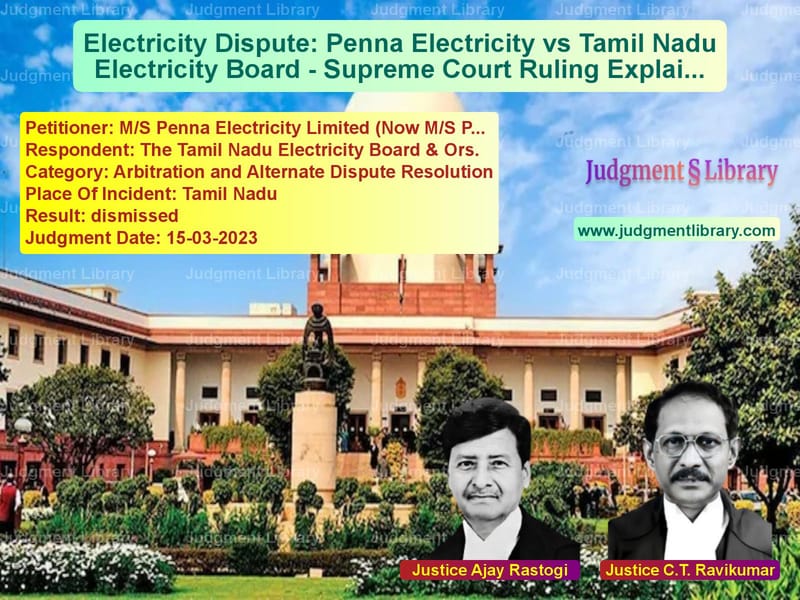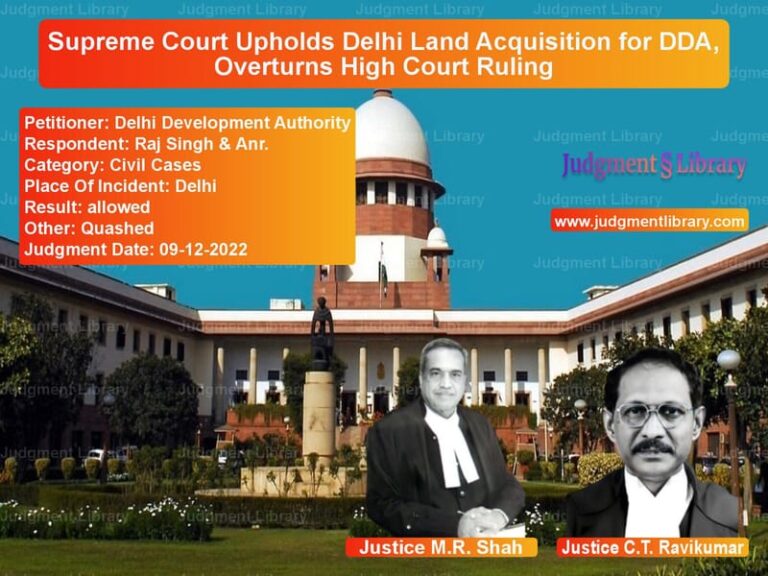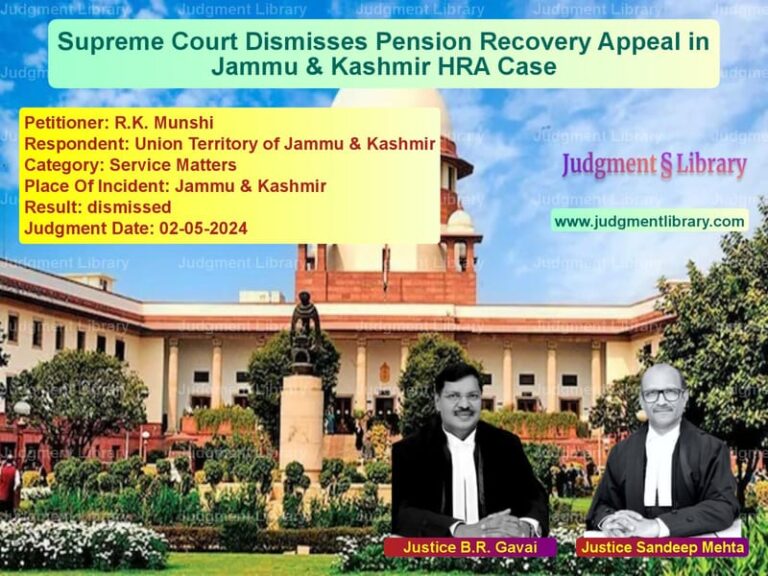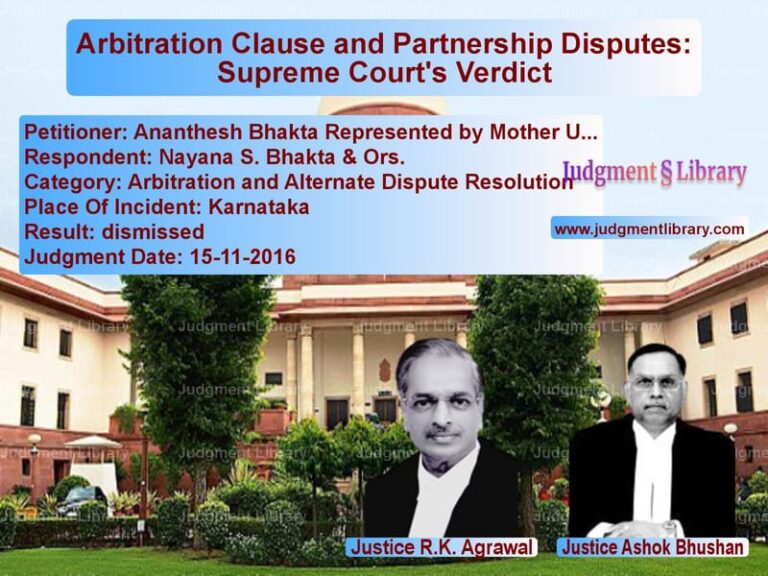Electricity Dispute: Penna Electricity vs Tamil Nadu Electricity Board – Supreme Court Ruling Explained
The dispute between M/S Penna Electricity Limited (Now M/S Pioneer Power Limited) and The Tamil Nadu Electricity Board & Ors. is a significant case concerning electricity tariff regulations and the enforceability of contractual obligations under a Power Purchase Agreement (PPA). The case was filed under Section 125 of the Electricity Act, 2003, and involved multiple levels of adjudication, including the Tamil Nadu Electricity Regulatory Commission, the Appellate Tribunal for Electricity, and finally, the Supreme Court of India.
The appeal primarily revolved around the appellant’s claim that the Tamil Nadu Electricity Board (TNEB) had failed to honor its payment obligations under the PPA due to a diversion of natural gas supply, which resulted in reduced power generation and financial losses. The appellant sought compensation for under-recovered fixed and variable charges, claiming that the respondent had unfairly benefited at its expense.
Background of the Case
M/S Penna Electricity Limited (now Pioneer Power Limited) entered into a Power Purchase Agreement (PPA) with TNEB. Under this agreement, the appellant was to supply electricity from its gas-based power plant. The plant had a capacity of 52.8 MW and was dedicated solely to supplying power to the Tamil Nadu Electricity Board. However, the appellant alleged that due to the diversion of gas to other generating stations by the Board, it could not meet its expected generation levels, leading to financial losses.
Consequently, the appellant filed a petition under Section 86(1)(f) of the Electricity Act, 2003, seeking the following reliefs:
- Payment of Rs. 25.63 Crores towards fixed charges and Rs. 8.10 Crores towards actual variable charges for power generated between October 29, 2005, and June 30, 2006.
- Payment of Rs. 18.06 Crores for under-recovered fixed charges for the period between July 1, 2006, and June 15, 2009.
- Payment of Rs. 12.77 Crores towards additional variable costs for power generation during the same period.
- Permission to use Naphtha or any other compatible fuel to increase and maintain the Plant Load Factor (PLF) as contemplated in the amended PPA dated August 25, 2004.
Decision of the Tamil Nadu Electricity Regulatory Commission
The Tamil Nadu Electricity Regulatory Commission dismissed the petition, rejecting the appellant’s claims. The Commission reasoned that the PPA did not include provisions for compensating fixed and variable charges due to fuel shortages. Furthermore, the Commission pointed out that securing the fuel supply was the responsibility of the power generator, not the Board.
Appeal Before the Appellate Tribunal for Electricity
The appellant challenged this decision before the Appellate Tribunal for Electricity, arguing that the diversion of gas to other generating stations had caused its financial distress. The Tribunal, however, upheld the Commission’s findings, stating:
“There is no provision for compensation for capacity charges and variable charges due to the fact that the plant was not able to maintain the normative availability/Plant Load Factor on account of shortage of fuel in the Central Commission’s Tariff Regulations, 2004, which were in vogue when the amended PPA was entered into between the parties.”
Supreme Court Proceedings
Following the unfavorable ruling from the Tribunal, the appellant approached the Supreme Court, challenging the legality of the findings. The primary argument presented by the appellant’s counsel, Mr. Parag P. Tripathi, was that the Tribunal had failed to consider that the gas supply shortage resulted from the Board’s actions rather than external market conditions. The appellant contended that:
- The gas supply was diverted to other power plants, which reduced its generation capacity.
- The Tamil Nadu Electricity Board unfairly benefited from this diversion while the appellant suffered financial losses.
- The Board should be directed to pay compensation, even if the PPA did not explicitly provide for it.
- Compensation should be granted based on the principles of quantum meruit, as established in precedents such as State of West Bengal vs. B.K. Mondal and Sons.
Arguments by the Respondents
The respondents, represented by their legal counsel, refuted the appellant’s claims, arguing that:
- The appellant had failed to meet the agreed-upon PLF due to its own inefficiencies.
- The PPA did not guarantee fixed charges in cases of underperformance.
- Shortages in gas supply were an issue between the generator and the fuel supplier (Gas Authority of India Limited – GAIL), not the Board.
- There was no contractual basis under the PPA for the claims made by the appellant.
Supreme Court’s Final Verdict
After reviewing the case, the Supreme Court dismissed the appeal, ruling that:
- There was no provision under the PPA or the Electricity Act, 2003, that required the Board to compensate the appellant for fuel shortages.
- The appellant had not pursued any remedial measures against GAIL for the alleged gas supply shortfalls.
- The fuel supply risk was to be borne by the generator as per the Government of India’s notification dated November 6, 1995.
- The Tribunal’s judgment was consistent with both the terms of the PPA and applicable tariff regulations.
The Court emphasized that power purchase agreements are binding contracts, and a party cannot seek compensation outside its agreed terms unless explicitly provided for in regulatory frameworks.
Thus, the Supreme Court upheld the decisions of the Regulatory Commission and the Tribunal, concluding that the appellant’s claims were not legally tenable.
Petitioner Name: M/S Penna Electricity Limited (Now M/S Pioneer Power Limited).Respondent Name: The Tamil Nadu Electricity Board & Ors..Judgment By: Justice Ajay Rastogi, Justice C.T. Ravikumar.Place Of Incident: Tamil Nadu.Judgment Date: 15-03-2023.
Don’t miss out on the full details! Download the complete judgment in PDF format below and gain valuable insights instantly!
Download Judgment: ms-penna-electricit-vs-the-tamil-nadu-elect-supreme-court-of-india-judgment-dated-15-03-2023.pdf
Directly Download Judgment: Directly download this Judgment
See all petitions in Arbitration Awards
See all petitions in Dispute Resolution Mechanisms
See all petitions in Arbitration Act
See all petitions in Commercial Arbitration
See all petitions in Enforcement of Awards
See all petitions in Judgment by Ajay Rastogi
See all petitions in Judgment by C.T. Ravikumar
See all petitions in dismissed
See all petitions in supreme court of India judgments March 2023
See all petitions in 2023 judgments
See all posts in Arbitration and Alternate Dispute Resolution Category
See all allowed petitions in Arbitration and Alternate Dispute Resolution Category
See all Dismissed petitions in Arbitration and Alternate Dispute Resolution Category
See all partially allowed petitions in Arbitration and Alternate Dispute Resolution Category







